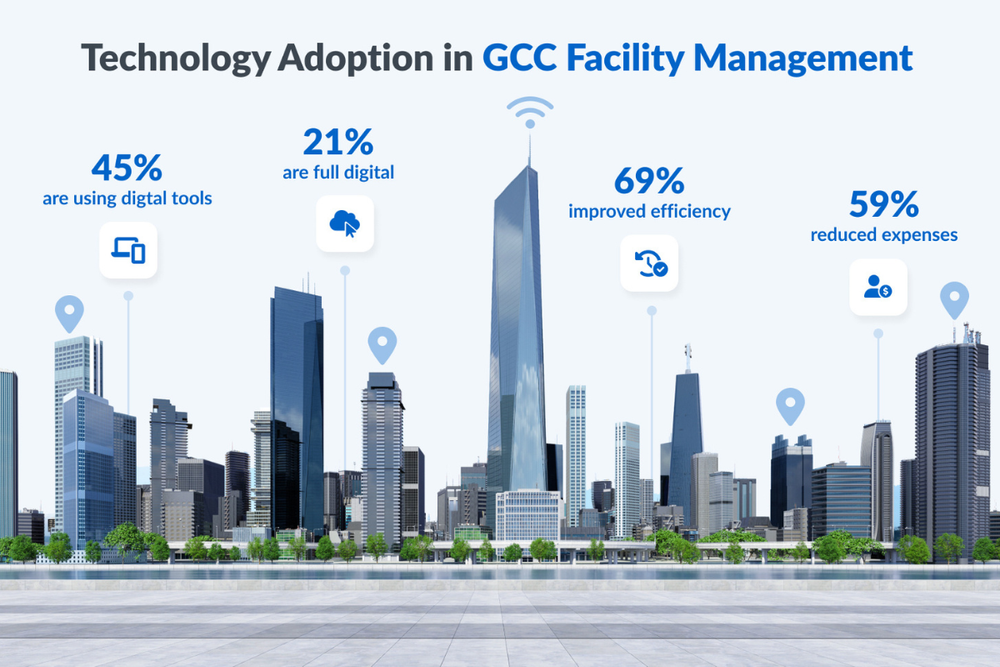The facility management industry in the GCC is experiencing a seismic shift as professionals adopt digital tools to meet rising operational demands. A new whitepaper from PlanRadar, in collaboration with the Middle East Facility Management Association (MEFMA), reveals that 68.97% of FM professionals report enhanced efficiency through centralized digital platforms, while 58.62% highlight cost savings from reducing errors and delays. This comprehensive report not only sheds light on the challenges FM professionals face but also provides actionable strategies to navigate them effectively.
A Rapidly Evolving Industry: The Role of Digital Platforms
The whitepaper highlights how the GCC’s FM sector is growing in complexity due to large-scale urban development and diverse facility types. 44.83% of professionals are adopting digital tools to streamline daily operations, and 62.07% are using Computer-Aided Facility Management (CAFM) software to optimize workflows. However, challenges like operational inefficiencies, workforce gaps, and sustainability pressures remain critical barriers.
Digital platforms are emerging as the cornerstone of modern facility management by enabling FM teams to digitize processes, enhance transparency, and improve decision-making. With tools for task management, predictive maintenance, and real-time reporting, professionals are not only overcoming these challenges but also setting new benchmarks for efficiency.
Improved Efficiency: Centralized Platforms in Action
Efficiency is a key driver for success in facility management. According to the whitepaper, 68.97% of FM professionals reported improved efficiency as one of the most significant benefits of adopting centralized digital platforms. These tools provide a unified interface for managing tasks, tracking maintenance schedules, and automating workflows.
For example, digital platforms eliminate the inefficiencies of manual scheduling and paper-based reporting, allowing teams to focus on strategic operations. By offering real-time insights and streamlined communication channels, these tools ensure seamless collaboration between stakeholders, from contractors to property owners.
Cost Savings: Reducing Errors and Delays
Cost control is a persistent challenge in facility management, with 58.62% of respondents reporting savings as a direct result of adopting digital tools. These platforms minimize errors by centralizing data, automating documentation, and providing predictive analytics.
Unexpected repairs and rework, often caused by miscommunication or outdated processes, are significantly reduced with predictive maintenance capabilities. FM professionals can use real-time data to identify potential issues early, preventing costly delays and extending the lifespan of critical assets.
Addressing Workforce Challenges
Workforce management is another critical issue, with 51.61% of professionals identifying skilled labor shortages as a major concern. The rapid pace of technological change requires continuous upskilling to ensure teams can effectively utilize digital tools.
The whitepaper emphasizes that intuitive platforms, combined with targeted training programs, can bridge this skills gap. By automating repetitive tasks and providing built-in training modules, digital platforms empower teams to work more efficiently and adapt to evolving demands.
The Rise of Sustainability in FM
While operational efficiency is paramount, sustainability is also becoming a key focus for the GCC’s FM industry. 56% of FM professionals reported that digital tools support sustainability initiatives, such as reducing energy consumption and improving resource management.
For example, IoT-enabled sensors integrated into digital platforms allow FM teams to monitor energy usage in real-time, identify inefficiencies, and implement targeted improvements. These capabilities align with regional initiatives like Saudi Vision 2030 and the UAE’s Net Zero by 2050 strategy, emphasizing the importance of green practices in facility management.
Digital Transformation as a Competitive Advantage
The report also highlights that 44.83% of FM professionals are in the early stages of digital transformation, while 20.69% have fully implemented digital solutions. Those who have embraced these technologies report significant benefits, including:
- 68.97% improved efficiency.
- 58.62% cost savings.
- 48.28% enhanced predictive maintenance capabilities.
These findings underscore the growing importance of digital tools in achieving operational excellence and staying competitive in a rapidly changing market.
Empowering FM Professionals: A Call to Action
The whitepaper offers a roadmap for FM professionals to harness the power of digital platforms effectively:
- Start with Core Tools: Implement task management and reporting solutions to address immediate operational needs.
- Scale to Advanced Technologies: Gradually adopt IoT, AI, and predictive analytics to maximize efficiency and cost savings.
- Upskill Teams: Invest in continuous training to ensure staff can leverage the full potential of digital tools.
- Focus on Collaboration: Use centralized platforms to enhance communication and align all stakeholders on project goals.
“Digital platforms are not just tools; they are enablers of transformation in facility management. This whitepaper provides FM professionals with the insights and strategies they need to embrace digital solutions and thrive in an increasingly competitive environment."
said Ibrahim Imam –Co-CEO, Co-Founder at PlanRadar
Discover the insights shaping the future of facilities management by downloading the whitepaper here.
News Source: Sherpa Communications









